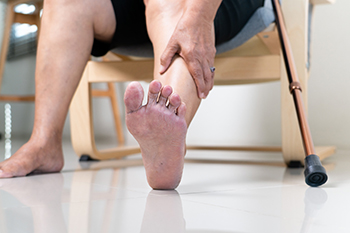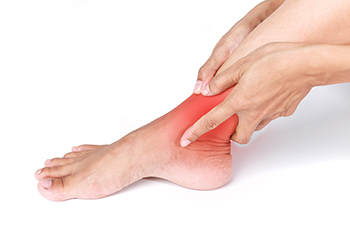Connect With Us
Blog
How Older Adults Can Promote Foot and Ankle Health
With age comes drier skin, brittle nails, decreased cushioning on bones, and even poor circulation. All of these factors can make foot and ankle health challenging. That is why it is important for older adults to be proactive about their foot and ankle health and help avoid problems from occurring. The best thing an older adult can do for their feet is to wear well-made, comfortable shoes that fit properly and offer adequate cushioning and support. Avoid wearing socks that are tight and can cut off circulation. Measure your feet when buying new shoes, because feet can widen with age. Try not to sit for too long without elevating your feet or doing gentle foot and ankle stretches to keep the blood flowing. Trim toenails straight across, but not too short, to avoid them becoming ingrown. Maintain a healthy weight prevent many painful foot conditions. Older adults with diabetes should avoid going barefoot, be sure to examine their feet every day, and check for developing wounds. Finally, older adults—and particularly those with diabetes—should make seeing a podiatrist regularly part of their foot and ankle health regimen.
If you need your feet checked, contact one of our podiatrists of Foot & Ankle Associates of Maine. Our doctors will attend to all of your foot and ankle needs and provide you with quality treatment.
Geriatrics and Podiatry
When people age, some common issues that may occur are bone density loss, dry skin, poor circulation, and rough brittle nails. These issues may also affect your foot health if the necessary steps are not taken to alleviate the problems.
It is important to take care of your feet because feet that are injured or diseased can affect your overall health. Having painful feet hinders your ability to do daily activities or may decrease your willingness to do the things that you need to do.
Visiting Your Geriatrician
As we age, health problems become more likely, so it is essential to visit your doctor for check-ups to ensure that you are doing the best you can to take care of your health. It is recommended to check your feet frequently for any possible cuts, bruises, swelling, corns or any other irregularities.
Taking Care of Elderly Feet
Cracked or dry feet can be treated by applying moisturizer often. It is also important not to wear old socks because the older the sock is, the higher the possibility there will be that there is bacteria there. Wear fresh socks and make sure they fit properly.
Proper foot health means that you can have a more active lifestyle and you will not be bogged down by pain. Foot health also leads to good circulation, which is paramount for overall health.
If you have any questions, please feel free to contact our office located in Brunswick, ME . We offer the newest diagnostic tools and technology to treat your foot and ankle needs.
Gout Pain Can Be Managed
Prevention Is the Key To Avoiding Sports Injuries
Playing sports is a great way to stay active and physically fit. However, it is important to practice a few precautionary methods to keep yourself safe and injury free. Take the extra time to stretch, warm up, and cool down properly. This alone will help you avoid many injuries. Staying hydrated will keep muscles from getting cramped and tense, which can lead to strains and tears. Learning the proper form and technique necessary to perform your sport will reduce the risk of fractures and other injuries. You can help avoid Achilles tendon injuries by strengthening your calves and cross-training. Another important prevention method is to wear the right athletic shoe for the sport you are playing, and make sure the shoe matches your foot type and that it fits properly. Always replace shoes that become worn down at the heel and tread. Make an appointment with a podiatrist for more advice on footwear, stretches and other preventative tips to avoid sports injuries.
All runners should take extra precaution when trying to avoid injury. If you have any concerns about your feet, contact one of our podiatrists of Foot & Ankle Associates of Maine. Our doctors will treat your foot and ankle needs.
How to Prevent Running Injuries
There are a lot of mistakes a runner can make prior to a workout that can induce injury. A lot of athletes tend to overstretch before running, instead of saving those workouts for a post-run routine. Deep lunges and hand-to-toe hamstring pulls should be performed after a workout instead of during a warmup. Another common mistake is jumping into an intense routine before your body is physically prepared for it. You should try to ease your way into long-distance running instead of forcing yourself to rush into it.
More Tips for Preventing Injury
- Incorporate Strength Training into Workouts - This will help improve the body’s overall athleticism
- Improve and Maintain Your Flexibility – Stretching everyday will help improve overall performance
- “Warm Up” Before Running and “Cool Down” Afterward – A warm up of 5-10 minutes helps get rid of lactic acid in the muscles and prevents delayed muscle soreness
- Cross-Training is Crucial
- Wear Proper Running Shoes
- Have a Formal Gait Analysis – Poor biomechanics can easily cause injury
If you have any questions, please feel free to contact our office located in Brunswick, ME . We offer the newest diagnostic and treatment technologies for all your foot care needs.
Why Is My Ankle in Pain?
Ankle pain can be caused by a variety of factors. For instance, you may have an ankle sprain or fracture. Ankle sprains occur when ligaments that support the ankle get stretched or torn, and fractures are actual breaks in one or more bones that make up the ankle joint. Pain in the ankle may also be caused by gout, rheumatoid arthritis, osteoarthritis and other types of arthritis which affect the ankle joint. There are other conditions such as nerve injuries, heel injuries, and blockages in blood vessels that may produce ankle pain. Pain due to tarsal tunnel syndrome (a compression of the tibial nerve in the tarsal tunnel) can be felt anywhere along the nerve, including the ankle. There may be painful damage to the cartilage or tendons in the ankle. If you are feeling pain in your ankle, get your condition evaluated and diagnosed by a podiatrist who can also create a treatment plan based on their findings.
Ankle pain can have many different causes and the pain may potentially be serious. If you have ankle pain, consult with one of our podiatrists from Foot & Ankle Associates of Maine. Our doctors will assess your condition and provide you with quality foot and ankle treatment.
Ankle pain is any condition that causes pain in the ankle. Due to the fact that the ankle consists of tendons, muscles, bones, and ligaments, ankle pain can come from a number of different conditions.
Causes
The most common causes of ankle pain include:
- Types of arthritis (rheumatoid, osteoarthritis, and gout)
- Ankle sprains
- Broken ankles
- Achilles tendinitis
- Achilles tendon rupture
- Stress fractures
- Tarsal tunnel syndrome
- Plantar fasciitis
Symptoms
Symptoms of ankle injury vary based upon the condition. Pain may include general pain and discomfort, swelling, aching, redness, bruising, burning or stabbing sensations, and/or loss of sensation.
Diagnosis
Due to the wide variety of potential causes of ankle pain, podiatrists will utilize a number of different methods to properly diagnose ankle pain. This can include asking for personal and family medical histories and of any recent injuries. Further diagnosis may include sensation tests, a physical examination, and potentially x-rays or other imaging tests.
Treatment
Just as the range of causes varies widely, so do treatments. Some more common treatments are rest, ice packs, keeping pressure off the foot, orthotics and braces, medication for inflammation and pain, and surgery.
If you have any questions, please feel free to contact our office located in Brunswick, ME . We offer the newest diagnostic and treatment technologies for all your foot care needs.




